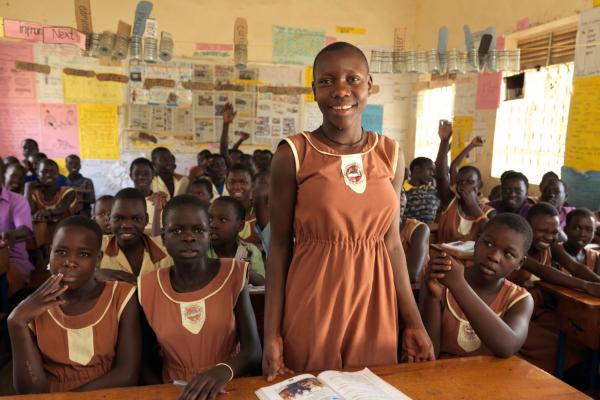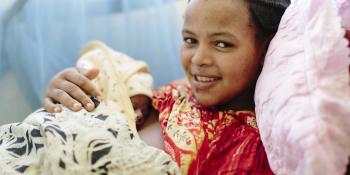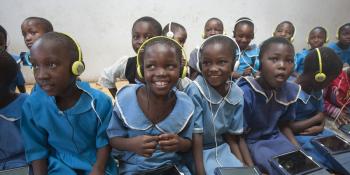We've worked in Uganda since 1965, building healthy communities, strengthening inclusive education systems, and supporting people to develop sustainable and resilient livelihoods.
In 2018-19, we reached a total of 149,210 primary actors across our three areas of work.
The SCOPE project equipped 2,000 young people with market-relevant skills training and qualifications
Our health programmes have reached over 60,000 of the most vulnerable people.
Healthy communities
We’re supporting youth and people with disabilities to access sexual and reproductive health services (SRHR) and advocate for their voice to be heard by care providers.
While Uganda has made some significant progress around SRHR, the country still experiences some challenges around accessing services.
Factors like education, wealth, location, and region in the country play a significant role in determining access to health. The 2016 Uganda Demographic Health Survey report highlighted women from rural areas, women with no education, and women with low income are less likely to seek critical health care than their urban-dwelling, educated, and wealthier counterparts.
In total, we’ve directly impacted over 60,000 people through our health work, with a specific focus on supporting the most excluded populations – including people with disabilities and/or living in hard-to-reach communities.
Make Way
Make Way seeks to promote the adoption of an intersectional feminist approach to sexual and reproductive health that enables people who are historically marginalised — like women, girls, LGBTQI+ people, youth, people from low-income communities and people living with disabilities — to have their needs accounted for in planning, budgeting and health service delivery.
The Make Way programme seeks to do this by building marginalised communities' lobbying and advocacy capacity, and ensuring they have representatives in decision-making processes.
The project also strengthens the capacity of Civil Society Organizations to demand that duty bearers implement policies and plans with an intersectional lens — looking at how individuals may experience multiple forms of inequality and face unique challenges at the intersections of those factors.
The Make Way youth panel engages youth to ensure intersectional practices are part of Uganda’s present and future.
Inclusive education

We're supporting girls across Karamoja to benefit from the quality education they deserve.
Our inclusive education programmes works to ensure that all children – especially girls and those with special educational needs – have equitable access to high-quality and inclusive education, by addressing some of the system-level barriers that can hold young learners back.
Our expert volunteers provide ongoing training and mentoring for teachers and education leaders, supporting them to improve their teaching effectiveness, and strengthening school governance and management.
By equipping teachers with the skills and knowledge they need to adopt child-centred practices, we’re building their capacity to deliver quality teaching – and in turn, improving the learning outcomes of marginalised children across the region.
Early Childhood Care and Education
Bidibidi Refugee Settlement
Bidibidi Refugee Settlement is a refugee camp in the Yumbe district of northwestern Uganda. With over 270,000 South Sudanese refugees fleeing the ongoing civil war. As of early 2017 it was the second largest refugee settlement in the world.
According to the United Nations refugee agency, Uganda hosts the largest number of unaccompanied child refugees in the world – some 41,200 in 2018 – with the majority less than 15 years old and nearly 3,000 younger than five.
With the funding from FCDO, VSO has been supporting Early Childhood Care and Education (ECCE) centers in zone three of Bidibidi Refugee Settlement since 2019. The project aims to improve access to inclusive and Quality Early Childhood Learning for children under 6 years in the settlement. T
his is a key period of brain development for children and ECCE is essential to ensure that children can prosper in the future. We’re aiming to reach 4,700 refugees and host community children aged 3 to 6, and 6,000 parents, with at least 10% of these being children with disabilities.
Resilient livelihoods
We're equipping young Ugandans with the technical skills and business acumen they need to thrive in the country's growing formal employment sector.
The Challenge Fund for Youth Employment
The Challenge Fund for Youth Employment (CFYE) is a five-year programme, funded by the Dutch Ministry of Foreign Affairs and managed by a consortium of partners: VSO, Palladium and Randstad.
By supporting youth employment initiatives, within West Africa/Sahel, Horn of Africa, North Africa and the Middle East, the programme will create a more prosperous future for 200,000 young people. The CYFE supports employment opportunities that are not only productive, but also provide a stable income and a safe working environment with respect for the rights and social protection of young people.
The first CFYE programmes started in late 2020 in Uganda, followed by Egypt and Nigeria (March 2021), Jordan, Sudan and Kenya (later in 2021). In 2022, CFYE programmes started in Tunisia, Morocco, Algeria, Senegal, Mali, Ethiopia, Burkina Faso and Niger.
Learn more about Challenge Fund
Previous projects
Futuremakers
December 2021 to 2023
Futuremakers worked with 500 vulnerable youth in Uganda aiming to improve employability skills for 200 young men and women, including people with disabilities, enhance entrepreneurship skills for 300 young people and create inclusive youth platforms and networks for 500 young people to enhance skills sharing and facilitate access to business development services.
Contact us
We work with a number of partners including the UK's Foreign, Commonwealth & Development Office (FCDO), IrishAid, EU, UNICEF, USAID, MasterCard Foundation, Greg Dyke and Sue Howes, and Stichting Dioraphte.
If you are interested in supporting our work, or if you have another query, get in touch:
Address: PO Box 2831, Kampala, Uganda
Tel: +256 41426 9655 or +256 41426 7728
Email: vsouganda@vsoint.org
Stories from Uganda
"I thought life had ended - but life has just begun" - Whycliffe's story
Whycliffe was supported by VSO to attain an internationally-recognised vocational qualification, which has transformed his fortunes. He now employs three other young people and dreams of volunteering to help other youth in his home near Hoima, Uganda.
Schoolgirl or bride? Millions of girls fight for basic rights
More than 130 million girls are out of school. Many dropped out out due to pressure to marry too young, robbing them of their childhoods, their rights and their future. It's not too late to rescue them from a bleak future.
A volunteer's life in Karamoja, Uganda
Marie Moreau from Dublin, who has just returned from volunteering with VSO Ireland as an Inspection Advisor in Uganda, talks about her experience helping to improve and extend the country's education system.
Find out more about our work in:

Maternal and newborn health
Improving access to quality healthcare for mothers and babies.

Education system strengthening
Developing inclusive education systems that leave no child behind.
Employment and entrepreneurship
Ensuring that everyone has access to decent employment and market opportunities.
